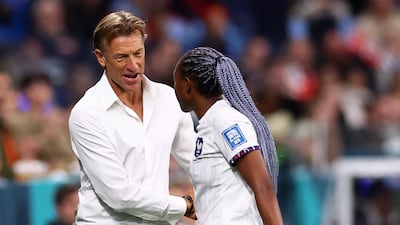Herve Renard was forthright. “I’m French. I was born in France. I have a French passport, but – and I’m sorry – tomorrow I will be supporting Morocco.”
"Tomorrow", in this case, was December 14th, 2022, which turned out to be merely part one of a seismic World Cup double-header: France versus Morocco. For the men’s version, a semi-final in Qatar, Renard felt uncompromised in his leanings.
He had coached the Atlas Lions for three and a half years until 2019, and his deep bond with the country and many of the players as he watched them make history by becoming the first senior team from Africa or the Mena region to reach the last four of football’s major showpiece, dictated his loyalties.
That remark, made by Renard to French radio, has been replayed more than once in the last few days, because his current job allows no such division of affection. He is now the French-born, French passport-holder who took over France’s women’s national team in March. Having guided Les Bleus to the knockout phase of the World Cup, he finds himself surprised to see the path to the quarter-finals obstructed by Morocco.
Or, rather, “pleasantly surprised,” as Renard put it to the French newspaper L’Equipe, not hiding his residual affection for Moroccan football, but, this time, very determined and focused on his France prevailing.
The surprise at how the Atlas Lionesses have set down landmarks in Australia’s joyously unpredictable World Cup – they are the lowest ranked team to reach the knockouts – is shared by many. Only two weeks ago, Morocco were still soothing the bruises from a 6-0 defeat by Germany in Melbourne. Two wins later, they were finishing above Germany in their group to earn today’s meeting in Adelaide with Renard’s Bleus.
Only eight months after France’s men defeated Morocco 2-0 in Al Khor, the comparisons between the two contests are inevitable, not least because of the special resonance of the fixture across cities and households in both countries. Renard is not alone for his twin ties. For the France left-back Sakina Karchaoui, the daughter of Moroccan parents whose childhood summers were spent in Taza, “it will be an emotional match”.
Morocco 1 Colombia 0 - in pictures
Likewise for Anissa Lahmari, scorer of the Moroccan goal against Colombia that put the Lionesses through to the last 16 of the World Cup. France-born Lahmari, who plays club football in France for Guingamp, and Karchaoui, of Paris Saint-Germain, are friends. They progressed through the French national youth squads at the same time, Lahmari then opting to play senior international football for the country of her maternal heritage earlier this year.
Others go back further. Eugenie le Sommer, the experienced French striker, 34, first knew Morocco’s Salma Amani when they played together as 13-year-olds in northern France, to where Amani had moved from Rabat as an infant.
Having made her Morocco debut more than a decade ago, Amani has been close witness to the sharp rise in the fortunes of the Lionesses, who are at a first World Cup and were on a podium in an Africa Cup of Nations for only the first time when they finished second as hosts last year’s Wafcon.
“I never imagined we would come across each other again at a World Cup,” remarked Le Sommer of Amani. “It’s destiny.”
In all there are eight members of the Morocco squad with dual French nationality. The Lionesses’ head coach, Reynald Pedros, is a Frenchmen, a former men’s international midfielder with a distinguished recent past as a manager in France.
He guided Olympique Lyonnais Women to successive Uefa Champions League titles in 2019 and 2020, when the club had in its ranks six of the current Bleus squad: Le Sommer, France captain Wendie Renard, goalkeeper Pauline Peyraud-Magnin, defender Selma Bacha and midfielders Kenza Dali and Amel Majri.
It’s a part of his past that Pedros intends to use. “I know this French team perfectly, and that’s an advantage,” he suggested.
Renard, whose managerial career has been largely concentrated in men’s football – he coached Morocco and Saudi Arabia, respectively, at the last two World Cups – acknowledges his opposite number brings a special insight into today’s clash. “He knows several of our players, so we have to be extra wary. We have to show humility against a disciplined side.
“And this World Cup has been full of surprises. They want to cut us down to size, simple as that – France represents something for Morocco.”










